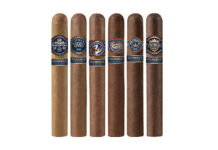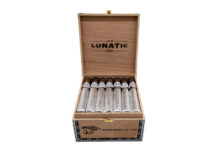“I remember initially thinking, ‘Who is Jorge Armenteros and why is he qualified to certify me?’ I even said to Jorge, ‘How about I take the test and if I pass, I get certified. If I fail, I’ll complete the coursework.’ Jorge declined and said the only way I could get certified was to complete the coursework and respect the process. I’m glad I did. I definitely would have failed the test,” Herklots reveals. “Taking the coursework and following the process gave me a great sense of appreciation for the tremendous amount of work that Jorge put into this curriculum—and also the generations of hard work and history that make the premium cigar industry so special.”
Herklots initially completed the Certified Retail Tobacconist program and later completed the Certified Master Tobacconist track as well. He believes in the value of TU’s program so much that those hired to work at the company’s New York City-based Nat Sherman Townhouse also are put through TU’s program. Herklots says having employees who are certified shows that Nat Sherman International takes the responsibility of being a tobacconist seriously.
Michael Dounoulis, general manager of Soho Cigar Bar in New York City, learned about TU by visiting other cigar bars, lounges and stores. After seeing that many of those establishments employed Certified Retail Tobacconists, he began asking questions about the program since the retail stores with the most informed employees were often those who completed TU’s coursework and passed its test. It took Dounoulis three months to complete the coursework, breaking down to four days a week of two-hour study blocks. He enlisted the help of his wife to help him study the material to prepare him for the test. Dounoulis completed one of TU’s newest programs, the Certified Cigar Sommelier Tobacconist certification, which is geared more toward those working in a hospitality setting.
Currently, TU comprises 438 Certified Retail Tobacconists and 980 Certified Retail Tobacconist Apprentices, representing more than 700 different companies. TU’s academic curriculum can be seen free of charge on its website by anybody in the world. This transparency is important to Armenteros because he considers the curriculum the foundation of the program’s credibility. The website is also well-maintained and will remove anyone listed as previously certified if they don’t have a valid email address in order to make sure all of the information is kept current.
Preparing for the Future
For 2019, there are some new products and services planned for TU that Armenteros believes will energize and help tobacconists for years to come. With years of experience under his belt and a stronger infrastructure in place to support TU’s initiatives, Armenteros is ready to deploy innovative new programs for both new and current certified tobacconists looking to give their careers and retail operations that extra edge they need to stay competitive.
This story first appeared in the November/December 2018 issue of Tobacco Business magazine. Members of the tobacco industry are eligible for a complimentary subscription to our magazine. Click here for details.
– Photography by Dariusz Kobajlo. Story by Antoine Reid, an editor and digital content director for Tobacco Business Magazine. You can follow him on Instagram @editor.reid.







